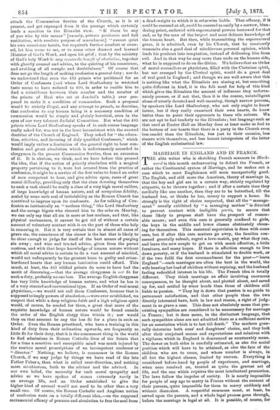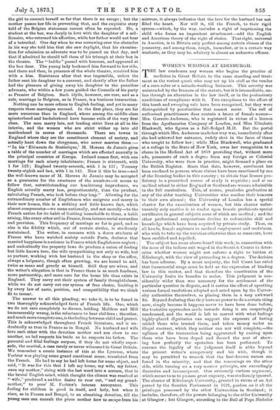MARRIAGE IN ENGLAND AND IN FRANCE.
THE able writer who is sketching French manners in Black- wood is this month endeavouring to defend the French, or rather the Continental system of Marriage, and he makes out a case which to most Englishmen will seem unexpectedly good. The English, and still more the American, theory of marriage is, that the boy and girl are in a certain way, strictly regulated by etiquette, to be thrown together ; and if after a certain time they cordially like one another, then they are to be betrothed, till the husband has, or thinks he has, money to support a home. So strongly is the right of choice respected, that all the " manage- ment " usually exhibited by "a managing mother" is directed to prevent contact with ineligible partis, to secure that those likely to propose shall have the. prospect of reason- able means ; and even this care is generally confined to girls, the boys in the middle and lower classes obstinately choos- ing for themselves. This maternal supervision is done with some care, but if after this care matters go awry, the families con- cerned generally submit, regret a love-match, pay what they can, and leave the new couple to get on with much affection, a little furniture, and many hopes. If there is affection enough to live down poverty, or if the husband is stimulated to double work, or if the two fulfil the first commandment for the poor—" leave England "—such marriages are often the best in the world, the wife bearing her load of children without repining, and the husband feeling redoubled interest in his life. The French idea is totally different. They think marriage an affair involving enormous consequences, to be thought about, and plotted about, and saved up for, and settled by wiser heads than those of children still liable to passion. "They lay it down that passion is no guide to permanent satisfaction, and that other people than the two directly interested have, both in law and reason, a right of judg- ment in so grave a case. This does not absolutely mean that pre- existing sympathies are considered to be unnecessary for marriage in France ; but it does mean, in the distinctest language, that such sympathies alone are not admitted there as a sufficient motive for an association which is to last till death." The mothers gene- rally determine both sons' and daughters' choice, and they look after their conjoined means and expectations and relatives with a vigilance which in England is denounced as unutterably mean. The dower on both sides is carefully estimated, as also the social position which will have to be attained, as also the fate of the children who are to come, and whose number is always, in all but the highest classes, limited by custom. Everything is considered before-hand by people of experience, and marriage, when once resolved on, treated as quite the gravest act of life, and the one which requires the most intellectual precaution. The laws follow the impulse of society. It is nearly impossible for people of any age to marry in France without the consent of their parents, quite impossible for them to marry suddenly and without discretion. A respectful summons must, at least, be served upon the parents, and a whole legal process gone through, before the marriage is legal at all. It is possible, of course, for
the girl to commit herself so far that there is no escape ; but the mother passes her life in preventing that, and the exquisite story told of the Belgian statesman cannot often be repeated. He, a student at the bar, was deeply in love with the daughter of a mil- lionaire, who returned his affection, while her father would not hear of a betrothal. One day when he was sorrowing over the obstacles in his way she told him that she saw daylight, that his examina- tion for admission as advocate was to be passed on that day, and that if admitted he should tell them of his triumph at their box in the theatre. The " laddie " passed with honours, and appeared at the box door. The young lady beckoned him forward to her side, and there and then, in presence of the whole theatre, received him with a kiss. Resistance after that was impossible, unless the father sent his daughter to a convent, and shortly after the father had the pleasure of giving away his daughter to the penniless advocate, who within a few years guided the Councils of his party as Premier of Belgium. Such idylls, however, are rare, and as a rule, marriage in Belgium, as in France, is a business transaction.
Nothing can be more odious to English feeling, and yet in many respects; these marriages succeed. In the first place, they are far more numerous than in England, where among the middle-class spinsterhood and bachelorhood have become evils of the very first class. The men marry late, not leading strict lives at all in the interim, and the women who are strict wither up into old maidenhood in scores of thousands. There are towns in England where they are the constituent element of society, and actually hunt down the clergyman, who never marries them :— " In his El4ments de Statistique,' M. Moreau de Jonnes gives a table of the number of marriages which are effected annually in the principal countries of Europe. Ireland comes first, with one marriage for each ninety inhabitants ; France is sixteenth, with 1 for 122; England twenty-seventh, with 1 in 137; Tuscany twenty-eighth and last, with 1 in 143. Now if this be true—and the well-known name of M. Moreau de Jonnes may be accepted as a guarantee for the exactness of the numbers—it seems to follow that, notwithstanding our headstrong imprudence, we English actually marry less, proportionately, than the prudent, calculating French, who look before they leap." Allowing for the extraordinary number of Englishmen who emigrate and marry in their new homes, this is a striking and little known fact, which almost compensates—we mean nationally, and not morally—to the French nation for its habit of limiting households to three, a habit arising, like every other evil in France, from intense social cowardice and prevision. This frequency of marriage so far is good, and so also is the fidelity which, out of certain circles, is studiously maintained. The writer, in common with a dozen students of France who have watched society outside Paris, declares that married happiness is a science in France which Englishmen neglect ; and undoubtedly the property laws do produce a union of feeling but little known here, the wife sympathising not only as wife, but as partner, working with her husband in the shop or the office, always a helpmate, though often growing, we are bound to add, twice as mean and greedy as himself. Still they are wives, and the writer's allegation is that in France there is as much fondness, more partnership, and more care for the home life than exists in England. They carry out their system of family thoughtfulness, while we do not carry out our system of free choice, limiting it by every law of caste, position, and compatibility that we think fit to invent.
The answer to all this pleading, we take it, is to be found in two thoroughly acknowledged facts of French life. One, which we do not care completely to discuss, holding Malthus and Mill immeasurably wrong, is the reluctance to bear children ; the other, and much more complete one, is the feeling between child and parent. This is acknowledged throughout French literature, and is un- doubtedly as true in France as in Bengal. No husband and wife love each other with the devotion mother and son show to one another, no lad respects his bride as he respects his father. The parental and filial feelings surpass, if they do not wholly super- sede, the marital, a case rarely or never witnessed in Great Britain. We remember a comic instance of this at the Lyceum, where Fechter was playing some grand emotional scene, translated from the French. He had to say he had left home for some object, and said, "It was for this that I left my home, my wife, my father, even my mother," rising with the lad word into a scream, that in the brutal English mind, which thought the climax was reached at "wife," produced a sudden desire to roar out, "and my grand- mother," to poor' M. Fechter's intense annoyance. This feeling for children is good in itself, and holy, but when it rises, as in France and Bengal, to an absorbing devotion, till the young man can consult the pious mother how to escape from his mistress, it always indicates that the love for the husband has not filled the heart. Nor will it, till the French, to their rigid system—which, by the way, includes a right of imprisoning the child who forms an imprudent attachment—add the English and American theory of the right of choice. That right, universal in America, is in Britain only perfect among certain classes of the peasantry, and among them, rough, immodest, or in a certain way unchaste, as they may be, adultery is almost an unknown offence.



































 Previous page
Previous page